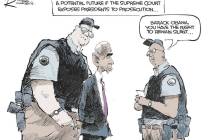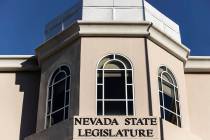Obama, Clinton oppose earmarks (wink, wink)
The "practice of inserting 'earmarked' spending into legislation is seen by lawmakers in both parties as a birthright power of the purse awarded to Congress by the Founding Fathers," The Associated Press reported March 13 in its coverage of the failure of a one-year earmark moratorium in the Senate.
It's not enough merely to say that position is wrong. To point out how far out of touch our elected "statesmen" have fallen from any normal or decent code of ethics, imagine the assertion were instead that those charged with packaging up foodstuffs for our sailors "consider it a birthright power to sell off part of the food for personal profit on the black market, replacing it with sawdust or stuff too rotten to eat because it won't be discovered till the ships are far at sea anyway," or that those assigned to operate orphanages "consider it a birthright power to sell their young charges into prostitution or slavery."
Both have happened -- so frequently that they were indeed considered routine, at one point in world history. But the fact that they came to be expected never made them right.
The Constitution makes it clear that the Congress may allocate public moneys only to advance the "general" welfare. Spending $200 million from the national treasury to build a bridge to an island with 50 inhabitants in far western Alaska does the typical taxpayer of Alabama or Arkansas no "general" good. Neither does an "earmark" to buy a bird-counting computer for UNLV -- stuffed by Nevada Sen. Harry Reid as an earmark plum into the spending allocation of the Department of Energy, not generally charged with counting birds, anywhere.
And it certainly cannot be justified as a better use for 21 percent of workers' salaries (much more, once we realize that Social Security withholding also goes into the general fund) than allowing them to keep the money to invest or to clothe themselves and their families.
In a hollow political gesture -- because few new spending bills are likely to be enacted in an election year, anyway -- a few Senate Republicans endeavored last week to enact a one-year moratorium on such pork spending. In the end, Arizona's John McCain, the apparent GOP nominee for president, could attract only 25 fellow Republicans to embrace the symbolic hiatus in the ongoing larceny. Three lonely Democrats joined the reformers as their bid failed, 71-29.
Safe in the knowledge the measure was going to crash and burn anyway, Democratic presidential hopefuls Hillary Clinton and Barack Obama -- both of whom cheerfully toot the whistle for whole trainloads of porkfat dispatched to their home states annually -- were among the three Democrats voting for a temporary halt to the massive misappropriations.
Sen. John Ensign, R-Nev., voted for the moratorium. Senate Majority Leader Harry Reid, D-Nev., on the other hand, voted to keep on looting the public treasury like there's no tomorrow.
How do Democrats hope to fund their huge spendfest? (They seek "generous increases to domestic programs," as well, The AP reports.) Why, the $3 trillion House Democratic budget plan blithely pencils in the largest tax hikes in history.
Rep. Shelley Berkley, D-Nev., voted for that plan, which would reverse all of President Bush's tax cuts. Republican Reps. Jon Porter and Dean Heller of Nevada were opposed.
So, shall Sens. Clinton and Obama now be allowed to contend they're "just as opposed to that terrible earmark pork as John McCain (wink wink, nudge nudge)"?
Not quite. Sen. McCain has vowed that, if elected president, he would veto any spending bill containing such earmarks.
If Sens. Clinton and Obama share an equal devotion to accountability, frugality and constitutional rectitude, let them similarly vow to veto any such spending bill to come before them.
And let them make it clear, while they're at it, that they refer to "The kind of spending personally requested by lawmakers for their own states, districts, and campaign donors -- outside the normal process of hearing and review -- now referred to as 'earmarks,' even if by next year they've come up with a new name for it."























